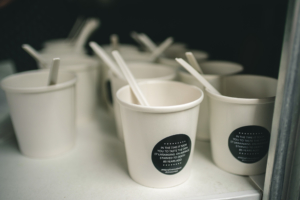Soup made from pine cones, bread made from grass and pancakes made out of tree bark.
These were the dishes offered up by a group of Ukrainian students and activists to residents of Brussels, Belgium, on May 16 in a project aimed at raising awareness in Europe about Stalin-era famine in Ukraine in 1932-33, known as the Holodomor.
They delivered food, cooked according to the written recollections of people who survived the Holodomor, in a food truck with the sign “UNCOUNTED Since 1932.”
The “uncounted” refers to people who died from the famine without being recorded, as the Soviet authorities kept the artificially-produced famine top-secret, both inside the country and abroad.
“We understood that there are enough exhibitions with pictures of the dead bodies (of those who died during the Holodomor) lying on the streets, and nobody wants to look at those pictures,” said Yaroslava Gres, one of the organizers of the event, in a video posted on her Facebook as she stood beside the food truck. “So we decided to make food.”
Ukraine, where by various estimates between three and seven million people had been killed during the Holodomor, is struggling to raise international awareness about the tragedy and to have it declared an act of genocide against the Ukrainian nation. Historians say the evidence clearly shows that Joseph Stalin starved Ukrainians to break their will and get them to give up their private farms and join state collective farms.
Belgium hasn’t recognized the famine as an act of genocide, despite the fact that several Belgian newspapers wrote about it in the 1930s.
The organizers of the event found that even Tintin, the popular Belgian comic book character, mentioned the extreme hunger in Ukraine in a comic book called “Tintin in the Land of the Soviets.”
As the food truck handed out the food, the students of the Ukrainian Leadership Academy, a 10-months program for secondary school graduates, which organized the event, were also delivering the leaflets to passersby.

Samples of the dishes cooked according to the written recollections of people who survived the Holodomor. (Mykyta Zavilinskyi)
The event made an impression on members of the Belgian public.
“When I held a loaf of bread made of grass, I felt what Ukrainian went through when the Soviet government forcefully took all their food away,” said Artur, a 32-year old resident of Brussels.
“I will definitely tell my children about this devastating tragedy.”
The first event of this type was held in Tel Aviv, Israel, in 2017, when Ukrainian students offered passersby a soup made of tree bark, pine cones, leaves, and roots. The current campaign is to take place in 10 countries.
